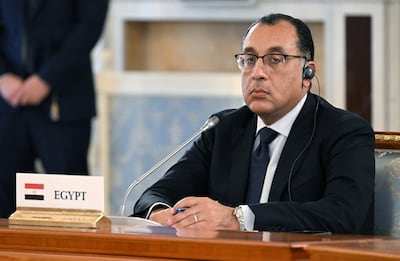Egypt has finalised contracts to sell $1.9 billion worth of state assets as part of a government initial public offering programme announced earlier this year to boost the role of the private sector and drum up foreign investment.
Of that amount, the government expects to receive $1.65 billion from foreign investors, Prime Minister Mostafa Madbouly said at a press conference on Tuesday evening.
The remainder of the sales will be paid for in Egyptian pounds, Mr Madbouly said, suggesting that these contracts had been sold to the country's private sector.
The government announced earlier this year that it would be selling shares in 32 state-owned companies to private sector investors, including an undisclosed number of companies owned by the armed forces, to meet demands from the International Monetary Fund ahead of its approval of a $3 billion loan to Egypt in December.
Another $1 billion in contracts will be announced soon, Mr Madbouly said.
He also asserted that the asset sale was not related to any economic crisis or deal with the IMF, but that it was a product of the state ownership policy, a legislation announced last year to increase private sector participation in the Egyptian economy and boost foreign investment.
Despite being announced in February, little had been heard on the progress of the government’s IPO, with a report from Goldman Sachs issued earlier this week suggesting that an ongoing dollar crunch was the main reason behind the stall.
Egypt intends to increase its dollar revenues to $191 billion annually by 2026, compared to the current amount of $70 billion, Mr Madbouly said.
A portion of this increase will come from tourism and commodity exports, which the government intends to increase by 20 per cent during the same time frame, he said.
Gulf investors are expected to take the lion’s share of the Egyptian government’s offering.
Egypt’s Minister of Planning and Economic Development Hala El Said revealed at Tuesday’s event that minority shares in three companies, worth $800 million, have already been sold to a major Abu Dhabi entity in a pre-IPO sale.
In May, the Egyptian government announced a number of economic and legislative reforms to boost foreign investment.
The reforms included lifting prior restrictions on the number of properties that foreign nationals can own in Egypt, more expedited state permits and a uniform tax policy.
Mr Madbouly said at the time that the reforms were implemented following repeated complaints from foreign investors.
Lands intended for industrial projects have been set aside and uniformly priced, Mr Madbouly explained, which was also a prior complaint from foreign investors, who would be given vastly different quotes.

The Egyptian economy is going through a trying time with headline inflation hitting a record 35.7 per cent in June.
The local currency has also lost over half of its value since early 2022 following three consecutive currency devaluations.
Egypt received the first tranche of its IMF fund facility, worth $347 million, in December following the loan’s approval by the fund's executive board.
It would have received the second tranche, equivalent to the first, following its first review by the IMF, which was slated for March.
However, the review was postponed till the end of June because Egypt had yet to fulfil its obligations under the deal.


